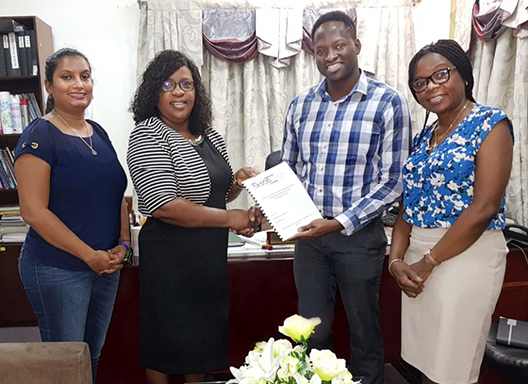
SASOD to undertake study of cost-effectiveness of Pre-exposure medication in HIV response
Image: SASOD Guyana Public Health Consultant Dr Nastassia Rambarran (left) and Managing Director Joel Simpson with Junior Health Minister Dr Karen Cummings (second, from left) and Deputy Chief Medical Officer Dr Karen Campbell
In January 2019, the Society against Sexual Orientation Discrimination (SASOD) Guyana Public Health Consultant Dr. Nastassia Rambarran and Managing Director Joel Simpson met with Junior Health Minister Dr. Karen Cummings and Deputy Chief Medical Officer Dr. Karen Campbell to discuss recommendations stemming from the organization’s “Assessment of Knowledge, Attitudes and Delivery Preferences for HIV Pre-Exposure Prophylaxis (PrEP) among Key Populations in Guyana.”
In a brief statement, SASOD Guyana said the meeting agreed that a study on the cost-effectiveness of implementing PrEP in terms of averting new infections would strengthen public policy in this area.
As a result, it announced that it has accepted the challenge to find resources and complete the cost-effectiveness study within the next six months. Based on its assessment, SASOD had called last year on the Government to include PrEP as part of its combination prevention approach for adult HIV infections.
One of the key findings of the assessment revealed that in Guyana knowledge of PrEP appears to be minimal, with 60% of the 47 participants stating that they did not know of PrEP, while a significant number of those who claimed to be aware of the option were actually confusing PrEP with Post-exposure Prophylaxis (PEP).
The assessment was conducted via focus groups in Regions Three, Four, Five, Six and Ten, with financial support from the International HIV and AIDS Alliance’s Rapid Response Fund.
Following research on its effectiveness, the World Health Organization (WHO) in 2014 recommended PrEP as an additional HIV prevention choice for groups, such as men who have sex with men and transgender women. This recommendation was extended to all groups in 2015.
WHAT IS PANCAP?
PANCAP is a Caribbean regional partnership of governments, regional civil society organisations, regional institutions and organisations, bilateral and multilateral agencies and contributing donor partners established on 14 February 2001. PANCAP provides a structured and unified approach to the Caribbean’s response to the HIV epidemic, and coordinates the response through the Caribbean Regional Strategic Framework on HIV and AIDS to maximise efficient use of resources and increase impact, mobilise resources and build the capacity of partners.
What are the Global AIDS Strategy 2021–2026 targets and commitments?
If targets and commitments in the strategy are achieved:
- The number of people who newly acquire HIV will decrease from 1.7 million in 2019 to less than 370 000 by 2025
- The number of people dying from AIDS-related illnesses will decrease from 690 000 in 2019 to less than 250 000 in 2025.
- The goal of eliminating new HIV infections among children will see the number of new HIV infections drop from 150,000 in 2019 to less than 22,000 in 2025.
What are the 95-95-95 Targets for ending AIDS?
- 95% of People Living with HIV know their HIV status;
- 95% of people who know their status on treatment; and
- 95% of people on treatment with suppressed viral loads.
HELPFUL LINKS:
Global AIDS Strategy 2021–2026, End Inequalities, End AIDS
https://pancap.org/pancap-documents/global-aids-strategy-2021-2026-end-inequalities-end-aids/
Caribbean Regional Strategic Framework on HIV and AIDS (CRSF) 2019-2025
https://pancap.org/pancap-documents/caribbean-regional-strategic-framework-2019-2025/
